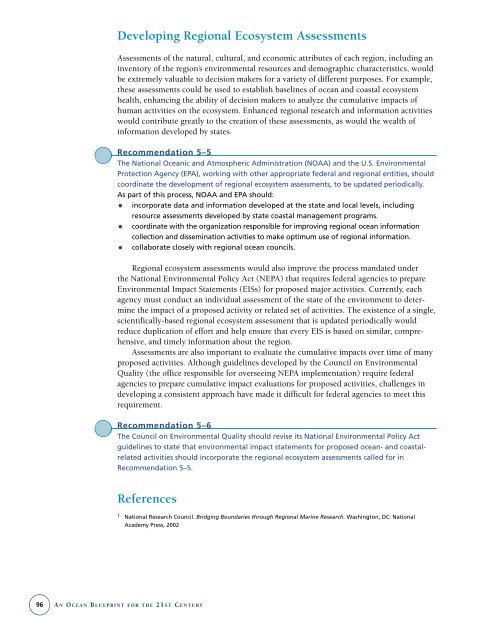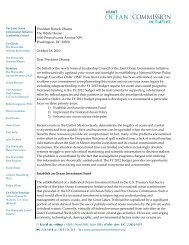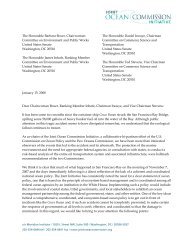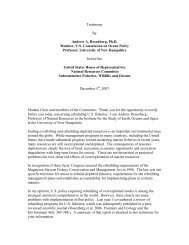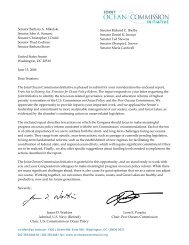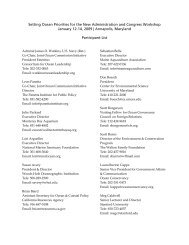- Page 3 and 4:
FINAL REPORTAN OCEAN BLUEPRINTFOR T
- Page 5:
THE UNITED STATES IS AN OCEAN NATIO
- Page 9 and 10:
1120 20TH STREET, NW • SUITE 200
- Page 11 and 12:
1120 20TH STREET, NW • SUITE 200
- Page 13 and 14:
1120 20TH STREET, NW • SUITE 200
- Page 15 and 16:
U.S. COMMISSION ON OCEAN POLICYChai
- Page 17 and 18:
Shirley A. Pomponi, Ph.D.President
- Page 19 and 20:
ACKNOWLEDGEMENTSAn effort of this m
- Page 22 and 23:
CHAPTER 3SETTING THE NATION’S SIG
- Page 24 and 25:
PART IVLIVING ON THE EDGE: ECONOMIC
- Page 26 and 27:
Periodic Review and Modification...
- Page 28 and 29:
Expanding Research and Education ..
- Page 30 and 31:
CHAPTER 26ACHIEVING A SUSTAINED, IN
- Page 32 and 33:
Index to the Recommendations ......
- Page 34 and 35:
LIST OF FIGURES AND TABLESFigure 1.
- Page 36 and 37:
LIST OF BOXESBox 1.1 Defining Coast
- Page 38 and 39:
PHOTOGRAPH IDENTIFICATIONAND CREDIT
- Page 40 and 41:
The Value of the Oceans and CoastsA
- Page 42 and 43:
The message from both experts and t
- Page 44 and 45:
Guiding PrinciplesThe Commi
- Page 46 and 47:
appropriate national policies, and
- Page 48 and 49:
Based on an improved understanding
- Page 50 and 51:
Figure ES.5 Many Different Platform
- Page 52 and 53:
Figure ES.6 U.S. Students Fall Behi
- Page 54 and 55:
ciated with coastal population and
- Page 56 and 57:
To ensure good coordination, the In
- Page 58 and 59:
liferation of federal and state pro
- Page 60 and 61:
Preserving Coral Reefs and Other Co
- Page 62 and 63:
pation of all ocean-related federal
- Page 64:
also produce revenues in time, and
- Page 68 and 69:
CHAPTER 1RECOGNIZING OCEAN ASSETSAN
- Page 70 and 71:
Figure 1.2 The Value of the CoastsJ
- Page 72 and 73:
Box 1.1 Defining Coastal AreasThe c
- Page 74 and 75:
Figure 1.4 The Shift from Goods to
- Page 76 and 77:
Box 1.2 The “Fourth Seacoast”
- Page 78 and 79:
chemicals tend to bind to particles
- Page 80 and 81:
coastal watershed counties grew by
- Page 82 and 83:
One of the most immediate phenomena
- Page 84 and 85: 30 Fleming, L.E., et al. “The Epi
- Page 86 and 87: CHAPTER 2UNDERSTANDING THE PASTTO S
- Page 88 and 89: ments. The Navy’s ocean data hold
- Page 90 and 91: The legislation was prompted by the
- Page 92 and 93: The architects of ocean-related pro
- Page 94 and 95: Congress on ocean and coastal issue
- Page 96 and 97: Figure 2.1 Invited Panelists Repres
- Page 98 and 99: CHAPTER 3SETTING THE NATION’S SIG
- Page 100 and 101: USCOP File PhotoThe Commiss
- Page 102 and 103: Figure 3.1 Large Marine Ecosystems
- Page 104 and 105: damage is also high, managers shoul
- Page 106 and 107: Figure 3.2 The Foundations of a New
- Page 108 and 109: PRIMER ON OCEAN JURISDICTIONS:DRAWI
- Page 110 and 111: The Territorial Sea (0 to 12 Nautic
- Page 113 and 114: PART 2BLUEPRINT FOR CHANGE:A NEW NA
- Page 115 and 116: Government agencies work on these a
- Page 117 and 118: Recommendation 4-1Congress should e
- Page 119 and 120: • reach out to state, territorial
- Page 121 and 122: Figure 4.2 Proposed Structure for C
- Page 123 and 124: References1 National Research Counc
- Page 125 and 126: significant initiative by federal a
- Page 127 and 128: The California Bay-Delta Authority
- Page 129 and 130: Box 5.2 Nature and Functions of Reg
- Page 131 and 132: Box 5.3 Moving Toward Improved Fede
- Page 133: data collection efforts are essenti
- Page 137 and 138: erable public opposition to certain
- Page 139 and 140: Box 6.1 Swimming through Hoops: Est
- Page 141 and 142: fairness and efficiency argue for a
- Page 143 and 144: NOAA Photo LibraryThis giant kelp f
- Page 146 and 147: CHAPTER 7STRENGTHENING THEFEDERAL A
- Page 148 and 149: The complexity of the current polic
- Page 150 and 151: tendency to duplicate similar exper
- Page 152 and 153: Nevertheless, during the 1970 reorg
- Page 154 and 155: Table 7.1 Thirty Years of Proposals
- Page 156: Table 7.1 (continued) Thirty Years
- Page 160 and 161: CHAPTER 8PROMOTING LIFELONGOCEAN ED
- Page 162 and 163: Crosscutting ThemesWhile this chapt
- Page 164 and 165: The coordination activities describ
- Page 166 and 167: Education and Sustainable Developme
- Page 168 and 169: each specialists to study marine an
- Page 170 and 171: Nonetheless, while the NSES do not
- Page 172 and 173: Box 8.2 COOL Professional Developme
- Page 174 and 175: Engaging Underrepresented and Under
- Page 176 and 177: Recommendation 8-10The National Oce
- Page 178 and 179: ences beyond the research arena. St
- Page 180 and 181: Recommendation 8-16The National Oce
- Page 182 and 183: Box 8.6 NOAA’s National Marine Sa
- Page 184:
References1 Belden, Russonello, & S
- Page 188 and 189:
CHAPTER 9MANAGING COASTS ANDTHEIR W
- Page 190 and 191:
The pattern of coastal growth—oft
- Page 192 and 193:
Box 9.3 What Is a Coastal Watershed
- Page 194 and 195:
nated, representing a variety of oc
- Page 196 and 197:
Box 9.4 Balancing Federal Ocean Act
- Page 198 and 199:
consolidated into a central reposit
- Page 200 and 201:
CHAPTER 10GUARDING PEOPLE AND PROPE
- Page 202 and 203:
Box 10.1 Hurricanes Wreak Havoc Alo
- Page 204 and 205:
spurred Congress to provide substan
- Page 206 and 207:
The federal governmentshould elimin
- Page 208 and 209:
CHAPTER 11CONSERVING AND RESTORINGC
- Page 210 and 211:
acquisition and easements are often
- Page 212 and 213:
Box 11.1 Examples of Large-scale Co
- Page 214 and 215:
step. There remains, however, a nee
- Page 216 and 217:
Protecting the Nation’s Wetlands:
- Page 218 and 219:
CHAPTER 12MANAGING SEDIMENTAND SHOR
- Page 220 and 221:
Figure 12.1 Dams Impede SedimentDes
- Page 222 and 223:
Developing Regional Strategies for
- Page 224 and 225:
of sediment (300 by USACE and anoth
- Page 226 and 227:
Long-term planning efforts for mana
- Page 228:
health of coastal areas. To be succ
- Page 231 and 232:
Table 13.1 The Leading Role of the
- Page 233 and 234:
Figure 13.2 Goods Traveling through
- Page 235 and 236:
coasts. One issue that may have spe
- Page 237 and 238:
Box 13.1 Federal Members of the Int
- Page 239:
tions. Similarly, in September 2003
- Page 242 and 243:
CHAPTER 14ADDRESSING COASTALWATER P
- Page 244 and 245:
Figure 14.2 Land-based NutrientsCan
- Page 246 and 247:
Figure 14.3 Changes in Funding for
- Page 248 and 249:
when total water volumes exceed the
- Page 250 and 251:
almost $1 billion per year required
- Page 252 and 253:
National Nonpoint Source Pollution
- Page 254 and 255:
Box 14.2 The Impact of Farm Nutrien
- Page 256 and 257:
impacts; and state and local govern
- Page 258 and 259:
Clean Air Act. In other words, the
- Page 260 and 261:
Collaboration at the Watershed Scal
- Page 262 and 263:
The federal government is taking so
- Page 264 and 265:
CHAPTER 15CREATING A NATIONALMONITO
- Page 266 and 267:
pling design and intensity, paramet
- Page 268 and 269:
Figure 15.1 Watershed Monitoring Ha
- Page 270 and 271:
that affect watershed, estuarine, a
- Page 272 and 273:
Box 15.2 Keeping Up With New Contam
- Page 274 and 275:
CHAPTER 16LIMITING VESSEL POLLUTION
- Page 276 and 277:
ment plans, the evidence of continu
- Page 278 and 279:
Port State ControlNations have the
- Page 280 and 281:
Figure 16.1 Most Cruise Ship Travel
- Page 282 and 283:
Recommendation 16-7The U.S. Environ
- Page 284 and 285:
Prior to recent international actio
- Page 286 and 287:
state, and port levels; resolving f
- Page 288 and 289:
coastal activities. Close coordinat
- Page 290 and 291:
CHAPTER 17PREVENTING THE SPREADOF I
- Page 292 and 293:
Figure 17.1 Great Lakes States Take
- Page 294 and 295:
Aquatic Plant Control Program, the
- Page 296 and 297:
Investments in new treatment techno
- Page 298 and 299:
• conduct a comprehensive nationa
- Page 300 and 301:
Recommendation 17-7The United State
- Page 302 and 303:
CHAPTER 18REDUCING MARINE DEBRISThe
- Page 304 and 305:
Dumping of Wastes and Other Matter
- Page 306 and 307:
tional materials on marine debris t
- Page 308 and 309:
Box 18.1 Abandoned Fishing Nets Cat
- Page 311 and 312:
PART VIOCEAN VALUE AND VITALITY:E N
- Page 313 and 314:
the expansion of U.S. fishing capab
- Page 315 and 316:
The Magnuson-Stevens Act requires e
- Page 317 and 318:
Recommendation 19-4The National Mar
- Page 319 and 320:
The lists of RFMC information needs
- Page 321 and 322:
Although the background and recomme
- Page 323 and 324:
confusion for fishermen and the pub
- Page 325 and 326:
Environmental Policy Act, the Admin
- Page 327 and 328:
Box 19.1 Dedicated Access Privilege
- Page 329 and 330:
Recommendation 19-16Congress should
- Page 331 and 332:
levels, the degree of cooperation i
- Page 333 and 334:
legal action. Enforcement difficult
- Page 335 and 336:
nomic costs to the fishermen and co
- Page 337 and 338:
a significant impact on survival of
- Page 339 and 340:
In addition to global and multilate
- Page 341 and 342:
Recommendation 19-27The National Oc
- Page 344 and 345:
CHAPTER 20PROTECTING MARINEMAMMALS
- Page 346 and 347:
NOAA Photo LibraryOverall, the larg
- Page 348 and 349:
successfully prevented species from
- Page 350 and 351:
The MMPA prohibits the taking or im
- Page 352 and 353:
Foundation, U.S. Army Corps of Engi
- Page 354 and 355:
and behavioral problems will arise
- Page 356 and 357:
ment data, make it difficult to eva
- Page 358 and 359:
CHAPTER 21PRESERVING CORAL REEFS AN
- Page 360 and 361:
coral reefs in the Florida Keys alo
- Page 362 and 363:
NOAA, Damage Assessment and Restora
- Page 364 and 365:
Recommendation 21-2As part of the n
- Page 366:
Recommendation 21-5The U.S. Coral R
- Page 369 and 370:
Figure 22.1 The United States Impor
- Page 371 and 372:
Administration, the U.S. Army Corps
- Page 373 and 374:
• include the development of a si
- Page 376 and 377:
CHAPTER 23CONNECTING THE OCEANSAND
- Page 378 and 379:
The oceans are thelast great fronti
- Page 380 and 381:
Table 23.1 The Bounty of the SeaThi
- Page 382 and 383:
Harmful Algal BloomsThe term harmfu
- Page 384 and 385:
Marine Bacteria and VirusesBacteria
- Page 386 and 387:
• developing in situ and space-ba
- Page 388 and 389:
indicator species does not provide
- Page 390 and 391:
CHAPTER 24MANAGING OFFSHORE ENERGYA
- Page 392 and 393:
Congress responded to this debate b
- Page 394 and 395:
Figure 24.2 A “Process Rich” bu
- Page 396 and 397:
Box 24.1 Offshore Liquefied Natural
- Page 398 and 399:
For decades, Congress has debated p
- Page 400 and 401:
Box 24.2 The Federal Consistency Pr
- Page 402 and 403:
Recommendation 24-2The U.S. Departm
- Page 404 and 405:
Conversely, there is no comprehensi
- Page 406 and 407:
1970s to the early 1990s that produ
- Page 408:
5 Richardson, G.E., et al. Deepwate
- Page 412 and 413:
CHAPTER 25CREATING A NATIONALSTRATE
- Page 414 and 415:
Figure 25.1 Proposed Structure for
- Page 416 and 417:
It is time for the United States to
- Page 418 and 419:
Box 25.1 Examples of Ocean and Coas
- Page 420 and 421:
ing enactment of the 1976 Magnuson-
- Page 422 and 423:
Coastal communitiesdepend on health
- Page 424 and 425:
typical. This type of funding is us
- Page 426 and 427:
acceptable progress. In response, t
- Page 428 and 429:
task of repeating surveys of the sa
- Page 430:
OTA occupied a unique role among th
- Page 433 and 434:
and technological capacity to devel
- Page 435 and 436:
Steps of a U.S. Plan (2000). The se
- Page 437 and 438:
nies, nongovernmental organizations
- Page 439 and 440:
Table 26.1 Proposed Core Variables
- Page 441 and 442:
Another gap is in the development o
- Page 443 and 444:
Recommendation 26-8Congress should
- Page 445 and 446:
IOOS. The differences in missions a
- Page 447 and 448:
Strengthening Earth Observations th
- Page 450 and 451:
CHAPTER 27ENHANCING OCEANINFRASTRUC
- Page 452 and 453:
Maximizing Resources through Collab
- Page 454 and 455:
improve the prospects for resource
- Page 456 and 457:
Dramatic advances insubmergence veh
- Page 458 and 459:
The Ocean Observatories InitiativeI
- Page 460 and 461:
(MMS), and EPA, and indirect help w
- Page 462 and 463:
• The USGS Coastal and Marine Geo
- Page 464 and 465:
Creating Virtual Marine Technology
- Page 466 and 467:
CHAPTER 28MODERNIZING OCEAN DATAAND
- Page 468 and 469:
Table 28.1 National Civilian and Mi
- Page 470 and 471:
Coping with the Flood of Incoming D
- Page 472 and 473:
type of education was wholly inadeq
- Page 474 and 475:
Interactions between private compan
- Page 476:
Recommendation 28-5The U.S. Navy sh
- Page 480 and 481:
CHAPTER 29ADVANCING INTERNATIONALOC
- Page 482 and 483:
Guiding PrinciplesThe guiding princ
- Page 484 and 485:
Table 29.1 U.S. Participation in In
- Page 486 and 487:
Table 29.1 (continued) U.S. Partici
- Page 488 and 489:
Commission, Intern
- Page 490 and 491:
• Seamounts. Worldwide concerns h
- Page 492 and 493:
U.S. Scientific Activities AbroadIn
- Page 495 and 496:
PART IXMOVING AHEAD:IMPLEMENTING A
- Page 497 and 498:
coastal management: “NOAA should
- Page 499 and 500:
Table 30.1 (continued) Summary of C
- Page 501 and 502:
dination among federal agencies (Re
- Page 503 and 504:
ally over the next five years. Chap
- Page 505 and 506:
Under the new ocean policy framewor
- Page 507 and 508:
coastal resource treaty rights. A l
- Page 510 and 511:
CHAPTER 31SUMMARY OFRECOMMENDATIONS
- Page 512 and 513:
• creation of regional ocean coun
- Page 514 and 515:
Office on Ocean Observing (Ocean.US
- Page 516 and 517:
Environmental Protection AgencyReco
- Page 518 and 519:
Complete List of Recommendations in
- Page 520 and 521:
Recommendation 4-6Congress should e
- Page 522 and 523:
Recommendation 5-6The Council on En
- Page 524 and 525:
Chapter 8: Promoting Lifelong Ocean
- Page 526 and 527:
Recommendation 8-10The National Oce
- Page 528 and 529:
• performance measures—State co
- Page 530 and 531:
Recommendation 11-2The regional oce
- Page 532 and 533:
Recommendation 13-3The U.S. Departm
- Page 534 and 535:
Recommendation 14-7The U.S. Departm
- Page 536 and 537:
• an overall system design that d
- Page 538 and 539:
Recommendation 16-14In developing a
- Page 540 and 541:
Chapter 18: Reducing Marine DebrisR
- Page 542 and 543:
Recommendation 19-7The Regional Fis
- Page 544 and 545:
Recommendation 19-16Congress should
- Page 546 and 547:
Recommendation 19-27The National Oc
- Page 548 and 549:
Chapter 21: Preserving Coral Reefs
- Page 550 and 551:
Chapter 23: Connecting the Oceans a
- Page 552 and 553:
Recommendation 24-4The National Oce
- Page 554 and 555:
• establish and maintain a single
- Page 556 and 557:
Recommendation 26-12The National Oc
- Page 558 and 559:
• coordinate federal agency effor
- Page 560:
Recommendation 29-8The United State
- Page 565 and 566:
APPENDIX AO CEANS A CT OF 2000
- Page 567 and 568:
Section 3. Commission</stro
- Page 569 and 570:
(H) Recommendations for any modific
- Page 571 and 572:
APPENDIX BA CRONYMS A PPEARINGIN TH
- Page 573:
MARPOLMEDEAMERHABMERPMLAMMCMMPAMMSM
- Page 576 and 577:
EXECUTIVE SUMMARYMore than thirty y
- Page 578 and 579:
1. INTRODUCTIONAconstant theme in d
- Page 580 and 581:
3. TRENDS IN POPULATION AND HOUSING
- Page 582 and 583:
ties. From 1970-2000, the number of
- Page 584 and 585:
Major conclusions from Table C.5 in
- Page 586 and 587:
Figure C.6 Composition of the Priva
- Page 588 and 589:
growth in wages and output, while g
- Page 590 and 591:
The value of beach recreation Beach
- Page 592 and 593:
of freight. Expansions and improvem
- Page 594 and 595:
of a network among these and other
- Page 596 and 597:
Table C.3 Population in Coastal Tie
- Page 598 and 599:
Table C.6 Private Ocean EconomyOcea
- Page 600 and 601:
ABOUT THE AUTHOR ANDACKNOWLEDGMENTS
- Page 603 and 604:
APPENDIX DG LOSSARY OF F EDERALO CE
- Page 605 and 606:
Oceans Act of 2000 ................
- Page 607 and 608:
SECTION 2OCEAN AND COASTAL-RELATEDF
- Page 609 and 610:
National Invasive Species CouncilNa
- Page 611 and 612:
Clean Water ActCongress enacted the
- Page 613 and 614:
Farm Bill 1985—Food Security ActT
- Page 615 and 616:
National Oceanographic Partnership
- Page 617 and 618:
SECTION 4OCEAN AND COASTAL-RELATEDF
- Page 619 and 620:
Clean Water Act—Total Maximum Dai
- Page 621:
National Park SystemThe National Pa
- Page 625:
Proposed Structure for Coordination
- Page 628 and 629:
CONGRESSIONAL COMMITTEES ANDSUBCOMM
- Page 630 and 631:
• Subcommittee on Forestry, Conse
- Page 633 and 634:
APPENDIX GD ETAILED C OSTS A SSOCIA
- Page 635 and 636:
Detailed Costs Associated with Reco
- Page 637 and 638:
Detailed Costs Associated with Reco
- Page 639 and 640:
Detailed Costs Associated with Reco
- Page 641 and 642:
Detailed Costs Associated with Reco
- Page 643 and 644:
Detailed Costs Associated with Reco
- Page 645 and 646:
I NDEX
- Page 647 and 648:
ecosystem-based management,62, 66-6
- Page 649 and 650:
Convention on the Conservationand M
- Page 651 and 652:
value of oceans, 30-36ecosystem ass
- Page 653 and 654:
erosion, 40, 182beaches, 42, 44, 16
- Page 655 and 656:
coral ecosystem effects, 44,320, 32
- Page 657 and 658:
oil, 236, 246, 362-363science and t
- Page 659 and 660:
Magnuson-Stevens FisheryConservatio
- Page 661 and 662:
National Ice Center, 402, 424, 430N
- Page 663 and 664:
dredging, 181, 183, 185-186,187, 19
- Page 665 and 666:
in marine transportation,192-193, 2
- Page 667 and 668:
evenues from resources, 33,102-103,
- Page 669 and 670:
treaty/treaties (see also agreement
- Page 671 and 672:
oceanographic research,49-50, 375,


